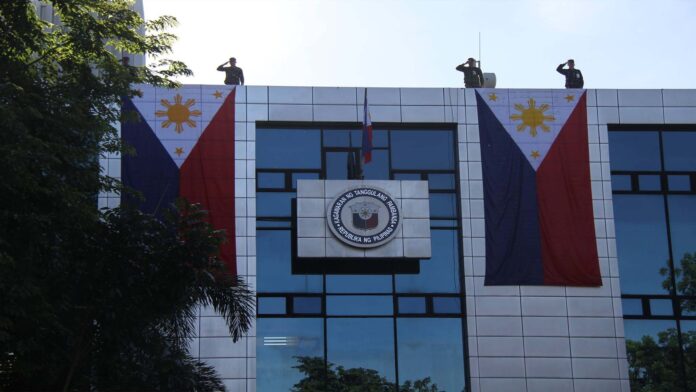The Department of National Defense (DND) on Saturday said it takes exceptions to claims that it is meddling in the internal affairs of China concerning Taiwan.
The statement comes following the remarks of Chinese Ambassador Huang Xilian on Friday, saying that the US intends to take advantage of the new sites under Enhanced Defense Cooperation Agreement (EDCA) to interfere in the Taiwan Strait situation.
Huang added that Beijing “reserves the option of taking all necessary measures” over the Taiwan Strait as it advised Manila to oppose “Taiwan independence” if it genuinely cares about the 150,000 Filipinos working there.
“The DND takes exception to the statement of Chinese Ambassador to the Philippines Huang Xilian that the Philippines is meddling in the internal affairs of China concerning Taiwan,” DND spokesperson Arsenio Andolong said in a statement.
He also corrected claims that the situation in Taiwan is similar to that of Mindanao.
“We wish to emphasize that the issues are different from each other. The whole context and rich experience of our peace process in Mindanao, which allowed the participation of the international community (Malaysia, European Union, Turkey, Japan, Brunei, Australia, Sweden, Norway, UK, Germany, United Nations organizations, Japan International Cooperation Agency and other international organizations), is aligned with the Philippines’ position of resolving disputes peacefully,” he said.
He stressed that Manila continues to observe the One China Policy and maintains the non-interference in regional issues principle by the Association of Southeast Asian Nations.
“We reiterate that our primordial concern in Taiwan is the safety and well-being of the Filipinos living and working on the island,” he said.
Amid the tensions in the Cross-Strait, however, Andolong said the DND deemed it prudent to prepare for any contingencies to ensure the safety of Filipinos overseas, especially those based in Taiwan.
“In the midst of the complex regional security landscape, the DND seeks to improve the Philippines’ defense capabilities through all the means available to us,” he added.
‘EDCA not targeting a country’
Andolong similarly reiterated that EDCA is not directed against any country and is in line with ongoing efforts to modernize the country’s alliance and enable collective defense and peace, promote the national interest, and protect its national sovereignty.
He said this is also being done to ensure the livelihood and welfare of Filipino fisherfolk and communities and enhance the capability to respond to emergencies and disasters, as well as provide humanitarian assistance.
“[W]e reiterate our appeal to all concerned parties and states to adhere to the rule of law and diplomacy in managing differences. The Philippines shall continue to advocate for peace, mutual respect and endeavor to protect and uphold our national and global interests,” he said.
Experts on Saturday highlighted the importance of EDCA amid a rapidly changing security environment in the region.
At the Saturday News Forum in Quezon City, De La Salle University International Studies Professor Renato Cruz De Castro said EDCA addresses some of the limitations of the Armed Forces of the Philippines’ (AFP) modernization program driven primarily by cost.
“EDCA sites are not only for building up the AFP, not only for deterrence. It has of course humanitarian assistance and risk reduction function,” he said.
“Of course, in the first place, he (Ambassador Huang) has no business telling us what to do with EDCA because we are a sovereign nation. All the EDCA sites, and this is something that all Filipinos should know, are within Philippine territory,” he added.
Gen. Edilberto Adan (ret.), in the same forum, said he supports the Marcos administration’s approach to increasing the country’s deterrent capability through the agreement.
“Alliance is not simply about fighting, alliance is about preventing wars. Alliance is for peace. But in case conflict erupts, the allies/the partners are assured that there is somebody alongside them to fight with them,” he said.
“So, it has several aspects – it prevents others from preying on the weak because they know the weak is allied with the strong. That’s one aspect of an alliance,” he added.
Status quo
Meanwhile, De Castro said the Philippines’ position over the issue should be for the status quo to remain over the Taiwan Strait.
“Let’s keep it that way, this is our interest. We are not concerned about Taiwanese independence, what is important is the status quo that has been there since 1949 should remain as it is,” he added. (PNA)
Photo credit: Facebook/DNDPHL


